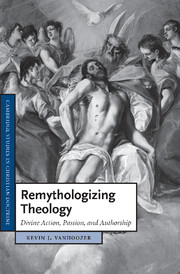Book contents
- Frontmatter
- Contents
- Preface
- Introduction: What is remythologizing?
- Part I “God” in Scripture and theology
- Part II Communicative theism and the triune God
- Part III God and World: authorial action and interaction
- Conclusion: Always remythologizing? Answering to the Holy Author in our midst
- Select bibliography
- Index of subjects
- Index of scriptural references
Conclusion: Always remythologizing? Answering to the Holy Author in our midst
Published online by Cambridge University Press: 04 May 2010
- Frontmatter
- Contents
- Preface
- Introduction: What is remythologizing?
- Part I “God” in Scripture and theology
- Part II Communicative theism and the triune God
- Part III God and World: authorial action and interaction
- Conclusion: Always remythologizing? Answering to the Holy Author in our midst
- Select bibliography
- Index of subjects
- Index of scriptural references
Summary
In a manner evident and yet mysterious, the poem or the drama or the novel seizes upon our imaginings. We are not the same when we put down the work as we were when we took it up.
Christian theologians have a ready answer to what for the philosopher is a speculative limit-question: Why is there something rather than nothing? Because God has spoken. God's speaking – a triune work of voice, word, and breath – forms, informs, and transforms the structures, substances, and subjects that make up the created order. God's speech acts cut and connect reality at the metaphysical joints and joists. Reality is divine rhetoric, the universe a poetic work of triune artistry: “God is the author of everything other than Himself.” Any theology that is not a response to revelation is, strictly speaking, irresponsible, in the sense that it is not a response to God's own self-presentation.
Why is there something rather than nothing to do? For the same reason: because God has spoken and continues to speak. God's speaking renders human persons answerable. The triune Author of creation, church, and canon thus bears no resemblance to the absentee Author that James Joyce depicts as wholly removed from his work: “The artist, like the God of creation, remains within or behind or beyond or above his handiwork, invisible, refined out of existence, indifferent, paring his fingernails.”
- Type
- Chapter
- Information
- Remythologizing TheologyDivine Action, Passion, and Authorship, pp. 469 - 504Publisher: Cambridge University PressPrint publication year: 2010



